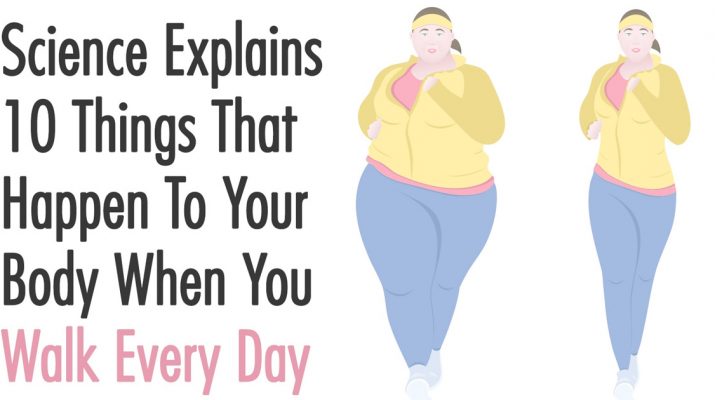“Walking is a man’s best medicine.” – Hippocrates
The benefits of walking for our physical and mental health are countless, and a daily 30-minute walk is a simple, accessible, and fun exercise. Walking will also prevent the development of various diseases, and significantly lowers the risk of heart problems.
These are ten things that will happen to your body if you start walking daily:
1. A healthy heart
It is the best exercise in order to prevent cardiovascular diseases. It lowers blood pressure and improves the lipid profile (cholesterol and triglycerides). Regular walking will reduce the risk of coronary episodes and death at a young age. It will also boost your heart rate and strengthens the heart muscles.
2. Blood sugar control
Walking after heavy meals will lower blood sugar levels, as it will burn energy by working up the muscles. Numerous diabetics use walking as a natural way to manage their condition, as well as older individuals with weight and obesity problems.
3. Stronger bones and joints
Walking forces the joints and bones to move against gravity, strengthening them, and lowering the risk of fractures, immobility, and bone mass loss due to aging. Regular walking treats joint stiffness, soothes inflammation, and relieves lower back pain.
4. Improved brain health
A study published in the American Journal of Preventive Medicine showed that women who walked for at least 200 minutes weekly felt emotionally better despite their depression diagnosis. Even low-intensity walking drastically improves mental well-being, lowers the levels of cortisol, boosts positivity, and clears the mind.
5. Lower back pain relief
Walking is a gentle, but healthy exercise, and it is excellent if you are suffering from low back pain. It boosts blood circulation, especially around the spinal structure, and it boosts its flexibility, relieving the pain.
6. Better eyesight
Walking is a positive and beneficial physical activity, and regular walks reduce the risks of glaucoma by 73 percent. While walking, you alter the blood flow and pressure, prevents vision loss, and improves the eyesight.
7. More efficient pancreas
The pancreas is crucial for the digestive system, as it produces the enzymes, hormones, and insulin that break down the consumed food. Low-intensity walks boost its efficiency by improving the production of insulin and accelerating metabolism.
8. Improved lung capacity
Walking boosts the function of the lungs, while you breathe in oxygen and breathe out carbon dioxide. While walking, we breathe harder, so the body uses more oxygen and releases more carbon dioxide, and it boosts the capacity of the lungs. Moreover, walking will accelerate the circulation, and improve the function of the lungs.
9. Toned muscles
Walking positively affects the muscles of the legs, helps you lose weight, and tones the legs.
10. Improved digestion
German researchers found that walking may accelerate the way the food travels in the stomach in order to help digestion. Therefore, take a 20-minute stroll after meals, in order to burn energy and prevent digestive issues, such as constipation.
Making walking a habit will provide numerous benefits, and the following tips will help you in the process:
- Find a companion to walk together, to enjoy your walks
- Try walking meetings instead of sit-down meetings
- Make walking a family activity, and take your partner, children, and even pets with you
- Take a stroll during the lunch break
- Try walking instead of driving or using public transportation
Dr. Mercola explains the positive effects of every single step you take:
“For starters, when you take your first few steps, your body releases chemicals that give your body a quick boost of energy. Once you get going, your heart rate will increase, from about 70 to about 100 beats per minute. This boost in blood flow will warm up your muscles. As you move, your body will also increase the production of fluid in your joints, thereby reducing stiffness.
Walking for six to 10 minutes can raise your heartbeat to about 140 beats per minute and trigger your body to start burning up to six calories per minute. While your blood pressure will rise from the exertion, this increase is counteracted by chemicals that help expand your blood vessels, such as nitric oxide.
Walking for 11 to 20 minutes results in an increase in body temperature and sweating as blood vessels closer to the surface of your skin expand to release heat. Epinephrine (adrenaline) and glucagon also begin to rise at this point to boost muscle activity. Epinephrine helps relieve asthma and allergies, which helps explain why walking and other exercises tend to have a beneficial impact on these ailments.”
Walking for more than 20 minutes offers even more benefits:
“At 21 to 45 minutes, you’ll start burning more fat, courtesy of a drop in insulin. Walking has also been shown to boost memory and creative problem-solving, so taking a walk when you’re puzzling over a problem may allow you to come up with better solutions.
After 30 to 45 minutes, you’re really oxygenating your whole body, burning more fat, strengthening your heart and cardiovascular system, and boosting your immune function.
Provided you’re walking outdoors and the weather complies, an hour of sunshine will also help boost your mood and provide a number of beneficial health effects associated with vitamin D production.”
As soon as you start walking daily, the amazing effects will keep you motivated to continue and enjoy it to the fullest!


